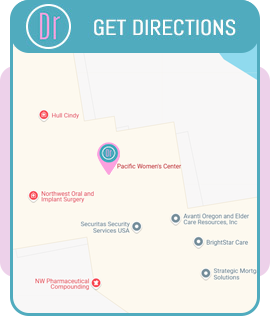Micro Tubal Reanastomosis Surgery Clinic in Eugene, OR
At Pacific Women’s Center in Eugene, OR, Dr. Richard Beyerlein MD, CPI, FACOG, and Tamara A. Stenshoel, MD, FACOG offer Micro Tubal Reanastomosis Surgery to help restore fertility. This minimally invasive procedure reconnects the fallopian tubes following tubal ligation. Their compassionate care ensures a personalized treatment plan to support your reproductive goals. To learn more, contact us or schedule an appointment online. We are conveniently located at 911 Country Club Rd. Suite 222, Eugene, OR 97401.




Table of Contents:
What is micro tubal reanastomosis?
How long does it take for your tubes to heal following a tubal reversal?
What should I expect after a micro tubal reanastomosis?
What is the procedure for tubal reanastomosis?
How do you prepare for tubal reversal surgery?
Micro tubal reanastomosis, also known as microsurgical tubal ligation reversal, is a surgical procedure used to reverse a tubal ligation. Tubal ligation is a surgical procedure used to sever the fallopian tubes to prevent pregnancy. However, some women decide to have their tubal ligation reversed to conceive a child.
The success of micro tubal reanastomosis depends on various factors such as the age of the woman, the length and quality of the remaining fallopian tubes, and the original method of tubal ligation. It’s important for women considering this procedure to consult a qualified reproductive specialist and carefully weigh the potential benefits and risks.
Generally, it takes several weeks to a few months for the fallopian tubes to heal and for the patient to fully recover from the procedure. However, the exact healing period after a tubal reversal will vary on a case-by-case basis.
During the initial recovery period, the patient must take it easy and avoid any activities that could put stress on the incision site. This includes avoiding strenuous activities such as heavy lifting, exercise, or any motion that could cause discomfort. Patients should also refrain from sexual intercourse for several weeks to allow the incision site to heal properly.
The doctor may also recommend using contraception for some time after the procedure to allow the tubes to fully heal before attempting to conceive. This will help prevent possible complications and ensure the highest chances of a successful recovery and future pregnancy.
After a microtubal reanastomosis, you can expect some discomfort and soreness in the pelvic area, which can be managed with over-the-counter pain medications. It’s extremely important to take it easy and rest for the first few days after the procedure to allow the body to heal. You should avoid heavy lifting, strenuous exercise, and sexual activity for several weeks after the procedure. This is to avoid putting stress on the surgical site and prevent infection.
The doctor will schedule a follow-up appointment to monitor the healing process and ensure you are recovering well. They may also prescribe antibiotics to prevent infection and promote healing. It’s crucial to carefully adhere to the doctor’s instructions regarding post-operative care, including any medication or dietary restrictions, to ensure a successful recovery. With proper care and follow-up, many women can successfully conceive after a micro tubal reanastomosis.
During the procedure, the patient is given general anesthesia to ensure their comfort during surgery. The surgeon will make small incisions in the abdomen to access the fallopian tubes, which are then carefully reconnected using specialized instruments and sutures.
Once the tubes are reconnected, the surgeon will ensure they are properly aligned. To conclude the procedure, the abdominal incisions are closed with sutures or surgical glue. The patient will be moved to a recovery room to be monitored until alert and stable. The length of the procedure and the recovery period will depend on each individual’s circumstances. Usually, patients can return home the same day as the surgery and resume normal activities within a few weeks.
Preparing for tubal reversal surgery involves several steps to ensure the procedure goes smoothly. First, you will need to undergo a thorough medical evaluation to determine if you are a good candidate for the procedure. This involves a physical examination, blood tests, and imaging studies to assess the condition of the fallopian tubes.
In the days leading up to surgery, you will need to follow any dietary or medication restrictions prescribed by the doctor. On the day of the surgery, you will need to avoid eating or drinking anything for several hours before the procedure. You should wear comfortable clothing and leave jewelry and valuables at home. It’s also important to arrange for someone you trust to drive you home after the procedure, as you will likely feel groggy and disoriented from the anesthesia.
Micro Tubal Reanastomosis Surgery is available at Pacific Women’s Center. For more information, contact us or schedule an appointment online. We are conveniently located at 911 Country Club Rd. Suite 222, Eugene, OR 97401. We serve patients from Eugene OR, Lowell OR, Springfield OR, Cottage Grove OR, Coburg OR, Creswell OR, Junction City OR, and surrounding areas.

ADDITIONAL SERVICES YOU MAY NEED
❱ Abdominal Hysterectomy
❱ Bladder Lift Surgeon Q&A
❱ Cervical Cone Biopsy
❱ Colposcopy
❱ Endometrial Ablation
❱ Endometrial Biopsy
❱ Female Sexual Dysfunction
❱ Gynecological Surgery
❱ Gynecology
❱ Hormone Therapy
❱ Vaginal Hysterectomy
❱ Endometriosis Diagnosis & Care



